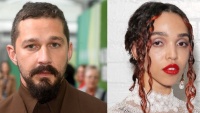FKA Twigs filed a lawsuit in Los Angeles Superior Court on Friday against actor Shia LaBeouf, accusing him of sexual battery, assault, and infliction of emotional distress, according to the New York Times.
The singer claimed during the nearly year-long relationship with LaBeouf that he allegedly isolated her from friends, physically abused her repeatedly, and knowingly gave her a sexually transmitted disease.
“What I went through with Shia was the worst thing I’ve ever been through in the whole of my life,” she told the New York Times. “I don’t think people would ever think that it would happen to me. But I think that’s the thing. It can happen to anybody.”
The singer, whose real name is Tahliah Debrett Barnett, said she began dating LaBeouf after she took part in his 2018 autobiographical film, Honey Boy. When they finished filming the movie, the two began dating, and she eventually moved out of her London home and into his apartment in Los Angeles, California.
After a brief honeymoon phase, Barnett claimed that she began to notice strange abusive behavior. She told the New York Times that LaBeouf would get angry if she ever looked at or spoke to men. He had set demands on how many times she had to kiss and hold him each day while keeping her away from the creative team that helped launch her career in London.
He forced her to never sleep with clothes on and she was terrified of going to the bathroom at night because he kept a loaded gun on his nightstand when he slept, according to the suit. He would often turn minor disagreements over preferences related to music into all-night fights, the lawsuit details.
In February 2019, during a trip to the desert, he repeatedly choked her during the night, she said in the lawsuit. The two were driving back from the trip in Los Angeles, the lawsuit says when he began driving erratically and threatening to kill them both in a crash if she did not say she loved him.
She begged him to stop and he eventually did at a gas station, where she took out her bags and tried to leave. He threw her against the car while screaming at her and eventually forced her into the passenger seat, according to the lawsuit.
Even as she began to realize that his behavior was unacceptable, she doubted herself, and he made a point of making her think her creative team was using her, she told the New York Times.
“I just thought to myself, no one is ever going to believe me. I’m unconventional. And I’m a person of color who is a female,” Barnett told the New York Times. “I’d like to be able to raise awareness on the tactics that abusers use to control you and take away your agency.”
Her manager, Michael Stirton, said he noticed a change in her as they put the finishing touches on her critically-acclaimed album, Magdalene.
She eventually began to plan her exit from the relationship with a therapist, but even that was difficult, she said. On one occasion she began packing her things and was ready to leave when he showed up at their apartment, Barnett said in the suit.
Their house cleaner provided a statement in the lawsuit confirming that she saw LaBeouf violently grab Barnett and lock her in a room.
“The whole time I was with him, I could have bought myself a business-flight plane ticket back to my four-story townhouse in Hackney,” she said. “He brought me so low, below myself, that the idea of leaving him and having to work myself back up just seemed impossible. It was actually very expensive, and a massive undertaking of time and resources, to get out.”
Barnett is not the only person named in the lawsuit. Another girlfriend of LaBeouf, Karolyn Pho, joined in the lawsuit and told the New York Times that he once headbutted her so badly that she began to bleed in one instance.
LaBeouf made headlines in 2015 when he "would have killed" his girlfriend at the time because she made him angry. The quote was caught on camera.
Barnett added that although she would have bruised arms from him grabbing her violently, she was afraid to go to the police out of fear that she would ruin his career. Other attempts to talk to her friends about it also fell on deaf ears, she said.
In response to the allegations, LaBeouf told the New York Times, “many of these allegations are not true.” But he added that both Barnett and Pho deserved the right to talk about what happened to them.
“I am not cured of my PTSD and alcoholism. but I am committed to doing what I need to do to recover, and I will forever be sorry to the people that I may have harmed along the way,” he wrote in an email.
“I’m not in any position to tell anyone how my behavior made them feel. I have no excuses for my alcoholism or aggression, only rationalizations. I have been abusive to myself and everyone around me for years. I have a history of hurting the people closest to me. I’m ashamed of that history and am sorry to those I hurt. There is nothing else I can really say,” he added.
Barnett said she plans to take any money she gets from the lawsuit and donate a large portion of it to domestic-violence charities. Many domestic violence organizations and charities across the world have been overrun with calls from women who have experienced abuse since coronavirus lockdowns forced people to stay at home, as Blavity previously reported.
“It was actually very expensive," Barnett said, "and a massive undertaking of time and resources, to get out."
